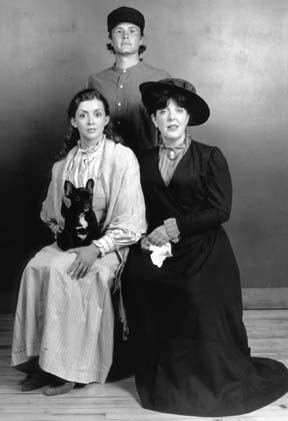Dread, Survival, and Humor: Chekhov’s “Cherry Orchard”
Jaime Kleiman reviews "The Cherry Orchard" at Theater in the Round; a full and satisfying production, running through October 3.

There is something about Anton Chekhov that can inspire dread – for some, it’s the fear of actually watching a Chekhov play. For others, it is the fear of Chekhov’s observations, how his characters slowly spiral into the depths of human unhappiness, covering it up with fake smiles, parties, and nightcaps. Of course, all classical plays are easier to understand if you have background knowledge; in his case, it helps if you’re familiar with 19th century Russian history. You’ll also need a sense of humor. Chekhov’s plays are comedies, after all. Or at least that’s what he said.
Theatre in the Round’s production of The Cherry Orchard, directed by Craig Johnson, gives both Rusky-lovers and anti-classicists something to cheer (or jeer) about. David Coral gives a powerful and moving performance as the peasant-turned-entrepreneur Yermolai Lopakhin, as does Sally Ann Wright as Lyubov Andreyevna, the childlike mistress of the soon-to-be-bankrupt estate. Stanislavski, the director who made Chekhov a household name at the Moscow Art Theatre, taught actors to play the opposite of what their character is feeling. This technique is utilized well by Wright – her giggles and attempts at buoyancy only serve to underscore her misery, revealing her character’s simplicity to be, in actuality, a carefully crafted attempt at survival.
Survival is the name of the game, and she’s not the only unhappy one in the house. All of the characters are facing the perils of existence in their own way – some through thoughts of suicide, some through song or love, and others through carefully held ideals about the world and their place in it. The Cherry Orchard, with its character studies of wealthy peasants, poor aristocrats, and fiery youth, offers a fascinating glimpse into the social and economic upheaval of the period.
Johnson’s directing is sometimes uneven, though. At the end of the first scene, for example, he weaves between realism and expressionism – a light appears from above and shines on Petya (Dustin Gingerich) as cherry blossoms fall from the sky in an aesthetically pleasing but stylistically inappropriate image. This made me wonder if every character was going to have their own “cherry blossom” moment. In any other play, it would have been a clever scene change; in this one, it was distracting and anachronistic. But Johnson grasps the play well in other places, particularly in Act II. The party scene on the night the orchard is auctioned off is riveting.
Kudos must also go out to the selection of Emily Mann’s clear and relatively modern translation. Overall, TRP’s production is solid, at times even enthralling, and it is worth seeing for those moments when these century-old characters are brought to bursting, three-dimensional life.
The Cherry Orchard, by Anton Chekhov, runs through Oct. 3. 612-333-3010.
Photo copyright Act One Too, Ltd.